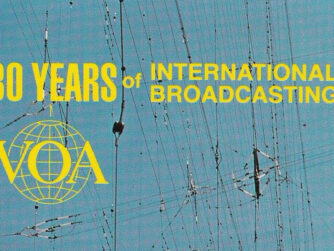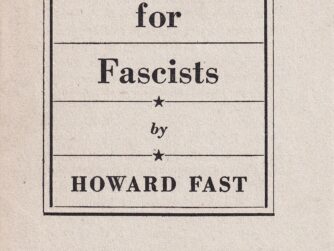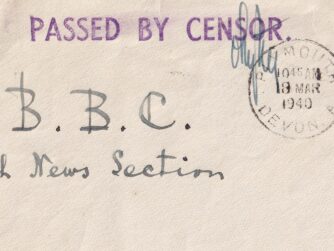Barmine and Other Refugee Journalists Criticized
Alexander Barmine’s honesty came under question in a book by Robert P. Newman, Owen Lattimore and the “Loss” of China, published in 1992 by the University of California Press, Berkeley. Newman, who was the head of the Public Address Division in the Department of Communication at the University of Pittsburgh, wrote that “Barmine had lied to the bureau” [FBI] and that, in the case of Owen Lattimore and Joseph Barnes, “the improbability of Barmine’s scenario is staggering.”1 The author suggests it was for Barmine “a formula for advancing the anti-Communist cause: bring charges of treason, not just of fellow-traveling, against specific Americans.” Newman also dismissed in his book as lies or vast exaggerations, testimonies of other ex-Communists who had made accusations of spying or Communist Party membership against various left-leaning Americans. Prof. Newman wanted his readers to believe that nearly all of these former Communists turned anti-Communists were opportunists and liars.
Holly Cowan Shulman, a scholar of U.S. government wartime propaganda who is the daughter of the second VOA director, Louis Cowan, described Joseph Barnes as “unquestionably and deeply loyal to the United States.”2 She wrote sympathetically about the leftist idealism of the early VOA leaders but also quoted American diplomat and statesman George F. Kennan, who knew Barnes while he was a foreign correspondent in the Soviet Union in the 1930s, describing him as “much more pro-Soviet than the rest of us–naively so… .”3
The strongly pro-Soviet OWI director, Elmer Davis, who himself repeated Soviet propaganda lies4 about the Katyn massacre in VOA broadcasts and commentaries carried by private U.S. radio networks but claimed that at the time he was convinced they were true, confirmed after the war that he had fired Barnes for opposing policies of the Roosevelt administration, but described him as a loyal American:
I thought he was a very able man, but he was too much addicted to what we called in the war localitis. He was head of the New York office, and it was eventually found desirable to remove him because he didn’t seem to be quite sufficiently in sympathy with the policies laid down in Washington. But I never had the slightest question about his loyalty.5
Could Barmine, whom his colleagues at the Voice of America and his family described as a man of integrity, make up the whole story of General Berzin telling him that Lattimore and Barnes were Soviet military intelligence (GRU) agents? I found no evidence of Barmine deliberately lying about any part of his biography or work. Still, the charge that ex-Communists turned anti-Communists and refugees from communism cannot be trusted had a long history among left-leaning former Office of War Information and Voice of America officials and journalists, some of whom had faith in Stalinist propaganda lies even long after they were exposed as such with irrefutable evidence. Wallace Carroll, a newspaper correspondent in the Soviet Union in 1941, was a particularly gullible journalist among Voice of America’s “founding fathers” and held key positions in the Office of War Information. His reports from Russia were filled with naive and uncritical acceptance of Soviet propaganda. After the war, Carroll was executive editor of the Winston-Salem Journal and Sentinel, served as news editor in the Washington bureau of the New York Times from 1955 to 1963, and was a member of the Pulitzer Prize Board. He still insisted in his book Persuade or Perish, published almost three years after the war, that the Soviet version of the Katyn massacre was accurate. He wrote in 1948:
As Hottelet [Carroll’s trusted advisor at OWI Richard C. Hottelet] had predicted, the dissension which was permitted to arise over the Katyn massacre was still working to the advantage of defeated Germany after the war. In July, 1946, more than three years after Goebbels opened his campaign, the German leaders on trial for war crimes at Nuremberg revived the allegations against the Russians in an obvious attempt to drive a wedge between the Soviets and the Western Powers.6
Wallace Carroll was a journalist and claimed to be a propaganda expert. Still, he was entirely deceived by one of the greatest Soviet propaganda lies. He was also one of many among the early and later Voice of America executives who looked down on anti-communist refugee VOA broadcasters if they happened to disagree with them.
There was another fault of American propaganda from New York that we strove to overcome with just as little success—a fault that can only be described as the émigré imprint. The Office of War Information, like the British propaganda agencies, had been quick to hire talented refugees from the lands overrun by Hitler and Mussolini. These exiles brought with them priceless gifts—linguistic skill, knowledge of national characteristics and customs, journalistic training. I came to know many of them and found them animated for the most part by a sincere desire to carry out the propaganda program of the United States government. But unfortunately some of them had brought with them passions and political convictions which sometimes proved too much for their good intentions. There were indeed times when they used the American radio to wage polemical battles in which the United States had no interest.7
However, Carroll may have exaggerated the number of VOA World War II era refugee broadcasters who did not share his optimistic view of the Soviet Union and Stalin unless he also included radically pro-Soviet ones, even for him. We know of only one Voice of America journalist, Konstanty Broel Plater, who had resigned from the VOA Polish Service in 1944 in protest against broadcasting Soviet propaganda lies.8
Foy D. Kohler, a State Department diplomat, and Soviet affairs specialist who was Voice of America director from October 1949 to September 1952, denied all the charges of Soviet propaganda influence within the Voice of America, made by former Office of War Information German desk editor Julius Epstein, a World War II Jewish refugee from Nazi-occupied Europe, and proceeded to tarnish his reputation to contacts outside the U.S. government. In a memo dated December 18, 1951, declassified many years later, Kohler wrote that Mr. Epstein’s activities were “colored with the cast of the disappointed job seeker.” In the same memo, Kohler also suggested that Epstein himself should be investigated.
Finally, I cannot forbear adding that perhaps the time has arrived to investigate Mr.Epstein himself. His immigration status is not known but it is assumed he has become naturalized since taking out his first papers in 1942. His actions would seem to indicate that he is not be [sic] best type of new American citizen.9
Epstein told the Madden Committee in an executive session on September 19, 1952, before his public testimony, that Alexander Barmine was one of his confidential contacts at the Voice of America who informed him about the continuing censorship of any substantial VOA reporting on the Katyn story until about May 1951. His other source was the then chief of VOA’s Polish Service, Józef Gidyński, who a year earlier had censored Józef Czapski’s talk about Katyn, apparently on instructions from the Voice’s senior management. The transcript of Epstein’s interview, marked as “SECRET,” was declassified in 2013.

Mr.Epstein. Nobody denies they didn’t carry anything.
Mr.Pucinski. I will tell you why I want this. Up to this point, all we know is, you have said VOA didn’t carry any Katyn news. Your word is good enough for me. But I want to establish it better. I would like to make certain that before we go out for VOA we don’t make fools of ourselves and they bring in a bunch of records.
Mr.Epstein. I am saying why don’t you call Mr.Gedinski (sic, correct Polish spelling Gidyński), who has always been the head of the Polish Desk, or Barmine, who is the head of the Soviet Desk of the Voice and they would gladly tell you if you ask, "Well up to this moment I think it was May, 1951, we could not carry anything substantial about Katyn." "We had a few lines, but we didn’t carry the letter or speech."
Mr.Pucinski. Your suggestions are very good.
Mr.Mitchell. All we have to do is verify.
Mr. Epstein. These are the people from the Voice of America at the Polish Desk and the Russian Desk.10
In his highly hagiographic book, Voice of America: A History, Alan L. Heil, Jr., former VOA deputy director of programs, wrote about Barmine that “He considered himself the leading expert on the Soviet Union, and often was loath to accept advice on news lineups or other daily details of programming.”11 Barmine was one of the top experts on the Soviet Union in the world. He knew far more about what the audience in Russia needed at that time in terms of news and commentary than any of the U.S.-born VOA officials and editors, some of them, like Reed Harris, still blinded by their former fascination with communism, even if they claimed to had overcome their youthful ideological bias.
Henry Wallace did not withdraw his support for the Soviet Union until the Korean War. In an article written in 1952, Wallace called the Soviet Union a country “utterly evil,” a term similar to the “evil empire” that President Reagan used against Soviet Russia many years later, drawing heavy criticism from some of the more far-left American and Western European journalists and politicians. Joseph Barnes, Owen Lattimore, and John Houseman never apologized for Soviet propaganda lies in Voice of America broadcasts. Howard Fast broke with the Communist Party USA, but not until 1956. Fast criticized Khrushchev’s suppression of the Hungarian uprising. Still, he did not renounce his support for communism in the Soviet Union and its satellite countries. He continued to support those communist leaders who, in his opinion, were believers in true socialism and sought political reforms.
It is worth noting that Wallace showed much more honesty and sincerity in the early 1950s than former Voice of America executives and journalists, who never admitted they were wrong and did not strongly condemn Communism and the Soviet Union. Of the heads of the U.S. government’s information agency, only the well-known journalist Edward R. Murrow, selected for the position by President John F. Kennedy, admitted that he had made a mistake in trying to get the BBC to withdraw from broadcasting his own film Harvest of Shame about migrant agricultural workers employed by American farmers because as a Kennedy administration official, he thought his film, made initially to be shown in the United States, could be too anti-American and perhaps misunderstood by foreign audiences. Other information agency and Voice of America officials before and after Murrow either excused pro-Soviet propaganda and censorship in the early and later years since the start of Voice of America broadcasts in 1942 or remained silent on the subject.
NOTES:
- Robert P. Newman, Owen Lattimore and the “Loss” of China (Berkeley: University of California Press, 1992), http://ark.cdlib.org/ark:/13030/ft296nb15t.
- Holly Cowan Shulman, The Voice of America: Propaganda and Democracy, 1941-1945, (Madison: The University of Wisconsin Press, 1990), p. 19.
- Ibid.
- “OWI Head Elmer Davis Spread Soviet Katyn Propaganda Lie in World War II Voice of America Broadcasts,” Cold War Radio Museum (blog), May 11, 2018, http://www.coldwarradiomuseum.com/owi-head-elmer-davis-promotes-soviet-katyn-propaganda-lie-in-the-us-and-in-voice-of-america-radio-broadcasts/.
- Elmer Davis Testimony, Hearings before the Select Committee on the Katyn Forest Massacre, Part 7, November 11, 1952, p. 1999.
- Wallace Carroll, Persuade or Perish (Boston: Houghton Mifflin Company, 1948), p. 152.
- Ibid., pp. 132-133.
- Ted Lipien, “Polish Radio Host Who Resigned from Voice of America to Avoid Broadcasting Soviet Propaganda Lies About Katyn Massacre – Cold War Radio Museum,” accessed April 18, 2023, http://www.coldwarradiomuseum.com/polish-radio-host-who-resigned-from-voice-of-america-to-avoid-broadcasting-soviet-propaganda-lies-about-katyn-massacre/.
- Foy D. Kohler, "Julius Epstein and the Katyn Massacre." Memorandum, Voice of America Historical Files 1946-1953 Reports-Psychologial Operations POC THRU Katyn Forest Massacres, RG59-Department of State-Entry#P315, National Archives at College Park, 8601 Adelphi Road, College Park, MD 20740-6001.
- House of Representatives, Select Committee on the Katyn Forest Massacre, "Statement of Julius Epstein," September 19, 1952, declassified April 26, 2013, p. 73.
- Alan L. Heil, Voice of America: A History (New York: Columbia University Press, 2003), p. 64.








